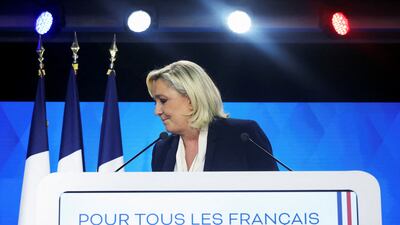Last weekend was a good one for supporters of liberalism. After much media-induced fear about the hard-right candidate Marine Le Pen winning, centrist Emmanuel Macron was re-elected President of France. Even though Ms Le Pen garnered more votes than she did in the previous election, it wasn’t really a close contest.
After five turbulent years of gilets jaunes’ riots and contested lockdowns and vaccine mandates because of Covid-19, Mr Macron won by 17 percentage points. By the standards of modern politics in the old democracies of Europe and North America, that is a landslide.
At the same time in Slovenia, one of the countries that emerged out of the violent disintegration of former Yugoslavia, three-term Prime Minister Janez Jansa, an admirer of former US president Donald Trump and Hungarian Prime Minister Viktor Orban, was easily defeated by Robert Golob. Described as being of the “liberal left”, Mr Golob had formed his Freedom Party only a year ago.
Trend spotters detected something new: authoritarianism and xenophobia were in retreat.
Maybe. It all depends on how one defines those terms.
We live in a world of identity by brand names. In theory, the labels you wear tell people everything they need to know about you. Political journalists and analysts also use labels: populist, nationalist, authoritarian. They are about as accurate a way of judging a country’s politics as judging a person by the fact that they wear Lacoste or Nike or Chanel. People are really more complicated than that.
Societies are even more complex than individuals and the reasons why people vote are often unique to a given country.
Mr Orban, for example, started out as a power-seeking opportunist, an astute reader of Hungary’s political mood. He was a liberal in the years after the Soviet Union collapsed before increasingly becoming a nationalist as resentment against the EU grew because the post-Cold War “peace” dividend did not reach much of Hungary. Outflanked by a nakedly racist and xenophobic party called Jobbik a decade ago, Mr Orban too became an authoritarian xenophobe and gobbled up Jobbik’s voters.
What is true is that the seismic changes that have troubled the politics of the old democracies during the past 15 years can be traced to a series of three shocks.
The financial crash of 2008-2009 led to the worst economic downturn since the Great Depression. But the bankers whose reckless, sometimes criminal, behaviour caused the crash were bailed out by governments. Ordinary citizens paid the bill through their taxes and reduced government services: the policies of austerity.

This bred real popular anger in Europe and America against the international institutions, such as the EU, which had become very powerful after the collapse of the Soviet Union. As recession took hold, it also bred traditional resentments against immigrants. Xenophobia always surges when work becomes scarce.
Racist and Islamophobic political parties, such as Germany’s AfD, began to gain traction.
In Europe this reached an extreme in 2015, when Turkish President Recep Tayyip Erdogan opened his borders with Greece and allowed hundreds of thousands of refugees from Syria and Iraq to flood into the EU. Ethno-nationalism was resurgent and xenophobic politicians feasted on the anger.
This led to the second shock: the 2016 earthquake. Britain voted to leave the EU and Mr Trump was elected US president. Both sets of votes were marked by the victorious campaigns’ rule-breaking change of tone and language. That’s a fancy way of saying outright lies, particularly about immigration. The language and messaging of politicians was dragged down to the level of angry bar room debate. Bar room arguments are known to end up in fist fights. The social fabric of both the UK and the US became dangerously frayed.
The entire liberal order seemed to be on the verge of being overthrown. Mr Trump didn’t hide his fondness for Russian President Vladimir Putin nor did Britain’s Brexiteer government. Mr Trump’s consigliere, Steve Bannon, engaged in his own personal shuttle diplomacy, visiting Mr Orban and other xenophobic authoritarians.
And it was not just in Europe and America that authoritarians with questionable belief in democracy were, such as Mr Orban, attacking the democratic processes that brought them to power. In Brazil and India, authoritarianism was on the rise.

But then came the third shock: Russia's invasion of Ukraine. The endless videos of epic destruction of city after city, the evidence of civilian massacres, the bravery of Ukrainians pushing back what the whole world assumed was one of its most powerful armies, reminded many people in the old democracies of what authoritarianism could lead to.
In the first round of the French presidential campaigns, the polls were close. One reason was that Mr Macron was busy dealing with the Ukraine crisis. In the second round, he was laser-focused on his campaign. When he and Ms Le Pen finally debated – for nearly three hours – on French television, Mr Macron’s killer moment came when he attacked her for her well-documented closeness to Mr Putin. Politically and financially. In the days after the debate, the polls dramatically began to run in the incumbent’s favour culminating in his victory.
So is this a new trend? Has the “authoritarian” moment passed?
Don’t ask me. I’m not a trend-spotter. But there are two elections this autumn that might give us a clue. The midterm Congressional election in the US and the presidential election in Brazil.
Will the Democrats and the left-leaning former Brazilian president Lula de Silva do as Mr Macron did and remind voters of their opponents’ love of Mr Putin? And if they do, will it prove to be a successful strategy? We must watch those campaigns closely.


